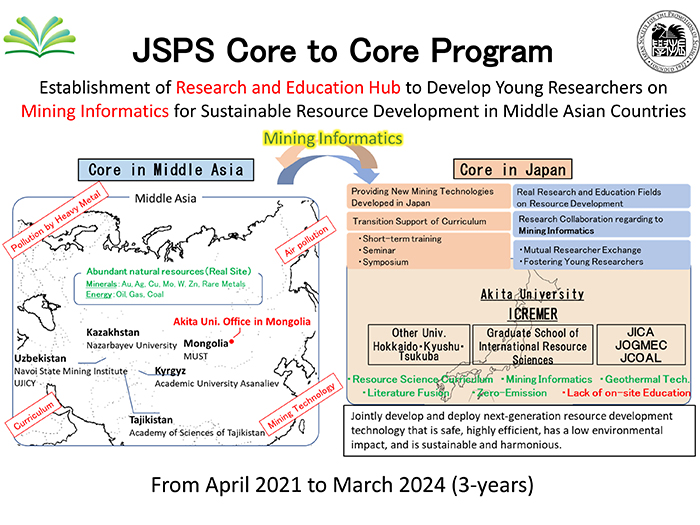

Project Title:
“Establishment of Research and Education Hub to Develop Young Researchers on Mining Informatics for Sustainable Resource Development in Middle Asian Countries”
Core Institution in Japan:
Akita University
Cooperating Institutions in Japan:
?Hokkaido University
?Kyushu University
?University of Tsukuba
Core Institution in Partner Countries:
?Mongolian University of Science and Technology (Mongolia)
?Nazarbayev University (Republic of Kazakhstan)
?Navoi State Mining Institute, Uzbek-Japan Innovation Center of Youth (UJICY) (Republic of Uzbekistan)
?National Academy of Sciences of Tajikistan (including Mining-metallurgical Institute of Tajikistan) (Republic of Tajikistan)
?Kyrgyz State University of Geology, Mining and Natural Resources Development, named after Academician U. Asanaliev (Kyrgyz Republic)
Project Period:
From April 1, 2021 to March 31, 2024
Project Outline:
In this research exchange, we aim to cultivate young resource information researchers through building educational and research foundations and deepening mutual exchanges with representative universities in countries: Mongolia, Kazakhstan, Uzbekistan, Tajikistan, and Kyrgyzstan that, regardless of whether or not they have been positioned as a frontier area in new resource development, have a high underground resource reserve potential (especially mineral resources), and yet experience a shortage of such human resources who can assume advanced technological and planning capabilities for resource development. Through this exchange, Japanese university students and young researchers, whose home country nearly completely lacks resource development sites, will have the advantage of a secured cutting-edge research field and being able to take part in practical educational research on resource development sites. For the five partner universities involved, this will become an opportunity for them to depart from the traditional Soviet Union resource science curriculum and in turn to study the academic domain of “Resource Informatics,” (which spans over resource exploration, resource development, mineral processing, smelting, environmental measures and others) with the vision of attaining “ideal methods of resource development from 2030 to 2050,” that Japan’s resource development industry is currently striving toward. Pursuits in this academic domain will thus result in the implementation and realization of “ultra-deep mining,” “zero-emission operations,” and “clean mining.”
